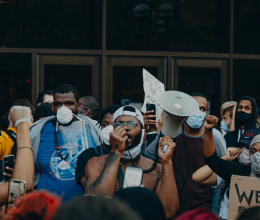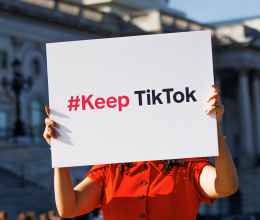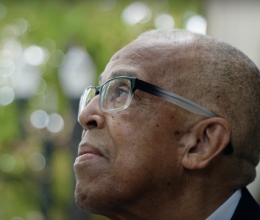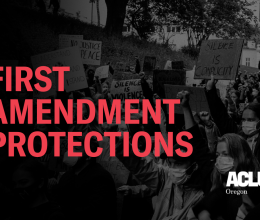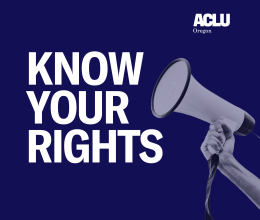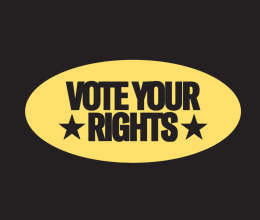
For years the government has tried to censor or burden access to sexual content in an attempt to block minors from accessing so-called explicit content. At the ACLU, we know that these efforts unlawfully burden adult access to sexual materials and do not actually keep kids safe. That’s why we’re headed back to the Supreme Court to challenge a Texas law that burdens access to sexual material in the name of protecting kids.
In FSC v. Paxton, we and the law firm Quinn Emanuel are challenging a Texas law that forces people to share personally identifying information — potentially including a picture of themselves, biometric scans, or their government ID — before they can access websites that host some amount of sexual content.
Texas’s age-verification law is another insidious attempt to dismantle our right to access information — and to express ourselves freely.
Texas Attorney General Ken Paxton claims this is a reasonable measure to protect minors. But the law will inevitably censor speech that is not pornographic, much less obscene. Even Texans who don’t watch porn could feel the effects. The law could potentially reach social media sites like Reddit, streaming services that host enough R-rated movies, or websites that focus on sexual health.
This is not new. For more than a century, restrictions on sexual content have been distorted, stretched, and misused for political gain. This has led to non-explicit content, like classical paintings and children’s picture books, being censored and suppressed.
As we head back to court, we examine the history of censoring sexual content — and why it so often ends up infringing on our First Amendment rights.
Lewd Content and Comstock

Alexandre Cabanel, Public domain, via Wikimedia Commons
In 1873, Anthony Comstock, an influential anti-vice crusader, convinced Congress to pass a federal law criminalizing the distribution of “obscene, lewd, or lascivious” materials through the mail or by common carriers. While initially conceived of as a way to suppress information about sex or abortion, the Comstock Act never officially defined “obscene” and this quickly led to it being used to ban all sorts of materials — explicit or not. For example, Comstock successfully brought charges against an art gallery owner who sold reproductions of famous nude paintings — including Alexandre Cabanel’s masterpiece “The Birth of Venus.”
While the law has not been enforced for decades, it was never repealed. Today, extreme anti-abortion groups are trying to convince the future Trump administration to revive it.
Movies and Dance
In 1907, Chicago enacted the first film censorship law, requiring movie theater owners to get permission from a police-run board to show certain films. Second Deputy Superintendent Metellus Lucullus Cicero Funkhouser, who served as the city’s chief censor, chose to eliminate movies with dancing because he believed they encouraged teenagers to go to dance halls, a source of “much crime and immorality.” Funkhouser even banned an instructional video on how to dance the Hesitation Waltz, the Turkey Trot, and the Tango. Other cities followed Chicago’s lead and enacted laws of their own.
Comic Books and Corruption
In 1954, a Senate subcommittee dedicated to investigating juvenile delinquency held days-long televised hearings on comics books and their alleged propensity to corrupt youth. The committee's star witness, Fredic Wertham, used his standing as a prominent psychologist to peddle pseudoscience about the dangers of comic books and promote anti-gay fearmongering. Though the Senate didn’t pass legislation, the hearings stoked public fear that comics were corrupting children and threatened to decimate the comic industry.
To save itself from financial ruin, the industry formed the Comic Codes Authority, which created a code for publishers to follow that would eliminate explicit content. To publish comics with the authority’s seal of approval, publishers needed to follow a dizzying array of restrictions, including bans on joking about divorce, vulgar language, and “sexual perversion” or “sexual abnormalities.” The code was used to erase LGBTQ+ characters, romance plots, and even mildly violent content, bringing the golden age of comics to an end and demonstrating how efforts to censor sexual content can quickly spiral out of control.
Book Bans
Book bans are nothing new, but in the last few years, local and state governments have banned books in public schools and libraries at reportedly alarming and unprecedented rates. These bans claim to stamp out “pornography” and other sexual or vulgar content, but have instead been weaponized against content that politicians or governments do not like. In Iowa, for example, a new state law that prohibits public schools from carrying books that contain descriptions of "sex acts" has resulted in thousands of removed books. But the removed titles are a far cry from Penthouse or Playboy. Instead, they include “I Know Why the Caged Bird Sings” by Maya Angelou, a children’s picture book about the U.S. Secretary of Transportation Pete Buttigieg, and “Maus” by Art Spiegelman.
Public libraries have also been ordered to take books off shelves. In 2021, officials in Llano County, Texas pulled 17 books from the county library system after community groups argued they were “pornographic filth.” Some of the titles banned for being pornographic included children’s picture books about farting, books about LGBTQ+ people or characters, and books about race in the United States.
First Amendment Rights
Much like these historic and current efforts at censorship, Texas’s age-verification law is another insidious attempt to dismantle our right to access information — and to express ourselves freely. At least 11 states have passed age-verification laws restricting access to sites that post sexual content since 2024, and several other states are reportedly considering such laws.
These age-verification laws draw a fence around ideas that the government finds objectionable. As today’s book bans, and other restrictions throughout history, show, such fences can have unexpected consequences for children and adults.
By taking this case, the Supreme Court has the chance to stem the tide of bills that wrongfully block sexual content and once again uphold all of our right to freely access constitutionally-protected speech — whether pornography or picture books.

